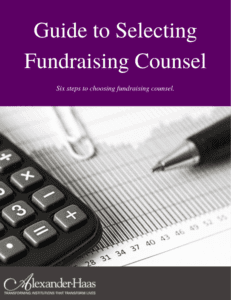After spending more than two decades preparing responses to requests for proposals (RFP’s) received at Alexander Haas, I appreciate those organizations that approach the process with forethought.
The most important and first step for an organization is to determine what they need. Organizations that get good proposals:
- are specific about what kind of fundraising counsel they seek,
- provide relevant information about themselves and their development program, and
- allow for the prospective fundraising consultants to ask questions about the RFP and the organization.
Our website has a section on “How to Select Fundraising Counsel” adapted from The Giving Institute. Organizations that follow the six-step process outlined increase their chances significantly in finding fundraising counsel that best fits their situation.
The first two steps, 1) identifying prospective consultants, and, 2) preliminary screening help the organization clarify what kinds of counsel it needs and wants. They are key steps to preparing an effective RFP and provide the prospective fundraising consultants who receive the RFP with a proper basis for providing a proposal based on a solid understanding of the organization.
At times we receive an email or telephone call with a request to ‘send me a proposal for x service.’ While there are basic elements for each service, each is customized for a specific client’s situation. Unless there is dialogue between Alexander Haas and the organization, there is a good chance the proposal won’t respond to specific needs.
Other times the RFP is issued by a purchasing office that has strict rules about no contact with the organization, a prescribed format for responses (whether it be an RFP for roof repairs or fundraising counsel), and pricing requirements that don’t fit our services such as a request for our hourly rate (all of our services are based on a flat project or phase rate). Encouragingly, we see more such RFP’s include room for considerable background information on the organization and an opportunity for prospective bidders to email questions with answers to all prospective bidders’ questions prior to the due date.
Given an opportunity for discussion early in the process, we can discern whether we are a good fit or not. In some cases we can recommend another firm that specializes in areas we do not – chamber of commerce and economic development campaigns, for instance.
The best RFP processes include ample time for the organization to get to know us and us to get to know them. That’s how good partnerships are developed from the outset.
Get our Guide to Selecting Fundraising Counsel
[/fusion_text][/fusion_builder_column][/fusion_builder_row][/fusion_builder_container]




